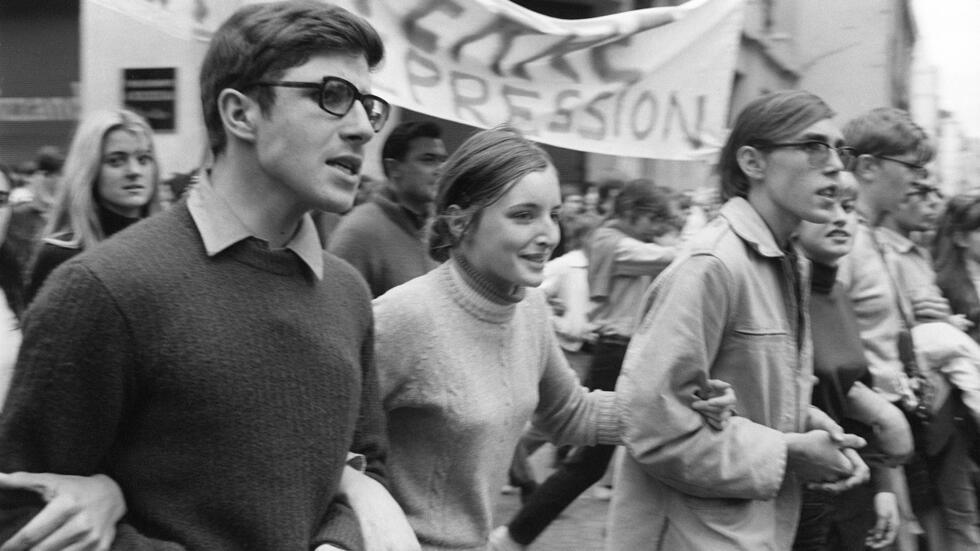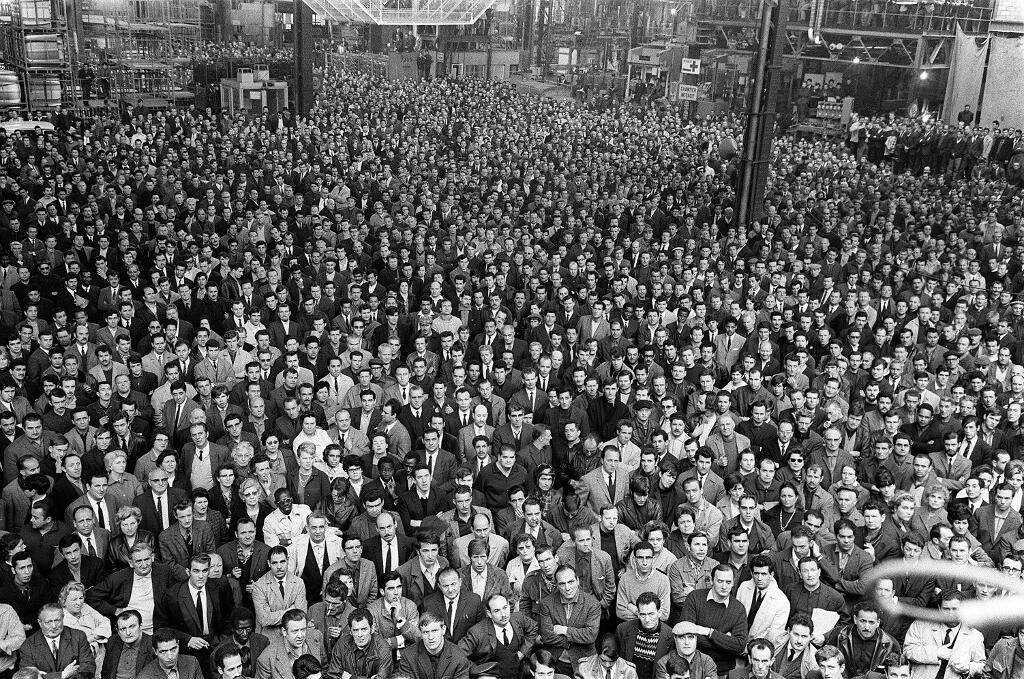50 years ago this month, France lived through mass protests, street battles and its biggest ever nationwide strike. May '68 had a considerable impact on French society but there's been no official commemoration of the 50th anniversary. Is it time to turn the page? Dominique Vidal turned 18 during that month and tells RFI why it deserves to have its place in history.

“My memories of the period before May '68 are in black and white. My memories of the period after May '68 are in colour.”

Dominique Vidal sports a bright red scarf as he reminisces on the terrace of l’Ecritoire, a famous café on Place de la Sorbonne, where he and fellow students would meet when they weren’t occupying the Sorbonne.
But there wasn’t much time to talk politics and work out the shape of the social and political revolution they hoped to bring about.
“The big problem was that very quickly the movement was confronted to a very harsh police suppression, and it changed the spirit of the movement.”
Instead of working on how to reform university life with new types of exams, new management, they ended up working on how to get their comrades out of prison.
What had been a positive movement “became a movement with a lot of negativity”.

Vidal says he never believed a real revolution was in the offing. “There was no alternative to the Gaullist power at the time, no unity between Communist and Socialist parties. De Gaulle was always the master of the game.”
Except perhaps from 28 to 30 May when De Gaulle fled France for Germany.
“There was a power vacuum at that time. For two or three days there was a slogan: gouvernment populaire, people’s government.”
But De Gaulle returned and thousands of right-wing students came out to support him in what was the biggest student demonstration of the whole period.
“After this big demonstration it was clear we are going to elections and the power will win the election. I remember the general secretary of the Gaullist party at that time, Amiral Sanguinetti, he said after the events ‘for those elections even a dog with the name UDR (Union des démocrats pour la république), the Gaullist party, will be elected’.”
The fashion to minimize May ‘68
May ’68 may not have brought about a political revolution but Vidal disagrees with the trend to brush it aside.
“There is a fashion with a lot of intellectuals to say ‘well 68 was nothing’ more or less. I don’t believe it. I think 50 years after it’s clear May ‘68 was a turning point.”
He cites the way it enabled trade unions to develop, as workers became aware they were a force to be reckoned with.
“Suddenly with the general strike [involving more than 20% of the French population at the time] French workers saw they had power and can use this power to gain important things.”
The Grenelle Accords that ended the strike led to a 30% increase in the minimum wage, a 10% increase in salaries overall and unions were allowed to have reps in the workplace.
“This is not 'nothing' for working people in France, it was important. And this conscience helped in the 70s and 80s to have a much bigger and stronger workers’ movement.”

Radical changes to French society
Turning 18 at the time Vidal experienced changes to French society first-hand and which have led to his more "colourful" vision post-68.
Women suddenly had more space and that allowed the feminist movement to rise; the gay rights movement also had its roots in May 68.
“The relation of people to their sexuality changed totally even during May 68,” Vidal says. “It was very important for people of my age during 68 to discover this. It was new, I was 17, 18 and I was not the only one to discover a sort of free sexuality. You can think what you want but it changed the way people think.”
But not everyone now thinks of it with fondness; for some it’s a period of anarchy.
In 2007 former right wing president Nicholas Sarkozy famously called for the heritage of May 68 to be “liquidated”.
The current government has not slammed it, but neither has it organised any official commemoration. Perhaps we shouldn’t be surprised. Emmanuel Macron was born a decade after May 68 and it’s not easy to commemorate the biggest show of anti-capitalism in French history when you champion the free market.
“I think there is a general political climate in France which is very reactionary,” says Vidal adding that many people are happy with this climate and don’t like '68 and don’t like to commemorate '68.
“They’re worried. Perhaps it could teach young people and perhaps it could give them some good ideas.”
And yet Vidal says we need ideas, and ideals, more than ever.
“There’s a big lack in France of alternative ideas, a lack of ideals. People don’t move when they don’t think it’s possible to change.”
One of the most famous slogans of May 68 was Soyez réaliste, demandez l’impossible (Be realistic, demand the impossible) and many students, like him, thought it was at least worth a try.
Vidal says whether you agree with May 68 or not, with the desire to unstrap France from the moral and political straight-jacket at the time, you cannot brush that month under the carpet.
“I think we have to talk about ‘68 like we have to talk about all important moments of our history: the war, the resistance, the liberation, the struggle against the Algerian war. May 68 is also a turning point. You have to talk about it and teach young people what it was. After, they will decide if they want to draw the lessons or not.”
Daily newsletterReceive essential international news every morning
Subscribe